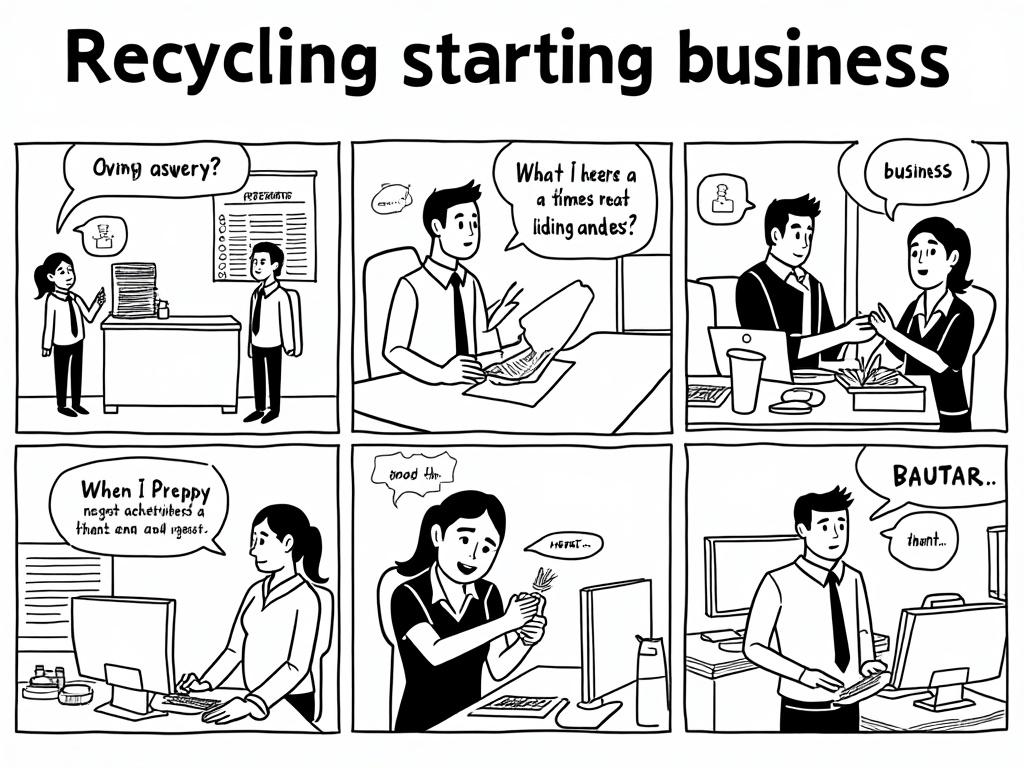
How to Launch a Profitable Scrap Metal Business in the UAE: Your Complete Strategic Guide
Reading time: 12 minutes
Table of Contents
- Market Reality Check: Why UAE’s Scrap Industry is Booming
- Understanding the UAE Scrap Business Ecosystem
- Your 11-Step Launch Blueprint
- Investment Breakdown: What You’ll Really Need
- Essential Documentation Checklist
- Strategic Advantages of UAE Operations
- Navigating Common Pitfalls
- Your Execution Roadmap
- Frequently Asked Questions
Market Reality Check: Why UAE’s Scrap Industry is Booming
Ever wondered why successful entrepreneurs are flocking to UAE’s scrap metal industry? Here’s the straight talk: The UAE processes over 2.5 million tons of scrap metal annually, with the market valued at approximately AED 8.2 billion as of 2024.
The construction boom, industrial expansion, and government sustainability initiatives have created an unprecedented opportunity. But here’s what most guides won’t tell you—success isn’t guaranteed just because the market is hot. You need strategic positioning, proper compliance, and operational excellence.
Quick Reality Check: Ahmed Al-Rashid started his scrap business in Dubai’s Al Qusais Industrial Area with just AED 150,000 in 2019. By 2023, his company was processing 500 tons monthly and generating AED 2.3 million annually. His secret? Understanding that scrap isn’t just about collecting metal—it’s about building efficient supply chains and maintaining quality standards.
Understanding the UAE Scrap Business Ecosystem
The UAE’s scrap industry operates within a sophisticated ecosystem driven by three key factors: construction industry demand, export opportunities, and government sustainability mandates.
Market Dynamics and Opportunities
The UAE Vision 2071 aims for 75% waste diversion from landfills, creating massive opportunities for scrap businesses. Dubai alone generates approximately 1.8 million tons of construction and demolition waste annually, with metal components representing 15-20% of this volume.
Here’s what’s driving demand:
- Infrastructure Projects: Dubai Expo legacy projects and Saudi-UAE connectivity initiatives
- Manufacturing Sector: Local steel mills requiring 60% recycled content by 2025
- Export Markets: Strong demand from India, Pakistan, and Southeast Asia
- Regulatory Support: Tax incentives for waste management businesses
Competitive Landscape Analysis
Market Share Distribution
Established companies with 1000+ tons/month
Growing businesses (200-1000 tons/month)
New entrants and niche specialists
Your 11-Step Launch Blueprint
Well, here’s the strategic reality: Successful scrap businesses aren’t built overnight—they’re systematically developed through methodical execution. Let’s break down your launch pathway:
Step 1: Conduct Strategic Market Research
Before investing a single dirham, you need comprehensive market intelligence. Focus on three critical areas:
Supply Analysis: Map construction sites, manufacturing facilities, and demolition projects within a 50km radius of your proposed location. Contact site managers directly—most are eager to discuss waste disposal challenges.
Pricing Intelligence: Current scrap metal prices fluctuate significantly. Aluminum averages AED 6-8 per kg, copper ranges from AED 20-25 per kg, and steel varies between AED 1.2-1.8 per kg. Track these for 3-6 months before launching.
Competitor Gap Analysis: Visit existing scrap yards, observe their operations, and identify service gaps. Most small operators struggle with transportation efficiency and customer service—your opportunity.
Step 2: Choose Your Optimal Business Structure
Your business structure directly impacts operational flexibility and tax obligations:
| Structure | Setup Cost | Liability | Best For |
|---|---|---|---|
| Sole Proprietorship | AED 15,000-25,000 | Unlimited | Small-scale operations |
| LLC | AED 35,000-50,000 | Limited | Medium-large operations |
| Free Zone | AED 50,000-80,000 | Limited | Export-focused business |
| Partnership | AED 20,000-35,000 | Shared | Joint ventures |
Step 3: Navigate Licensing Requirements
Here’s where many entrepreneurs stumble—licensing complexity. You’ll need multiple permits:
Primary Trade License: Industrial or Commercial license from DED (Dubai) or equivalent emirate authority. Processing time: 5-7 business days, cost: AED 15,000-25,000.
Environmental Clearance: Essential for waste handling operations. Dubai Municipality requires detailed waste management plans and site inspections. Timeline: 2-4 weeks.
Fire Safety Approval: Civil Defence clearance for your facility. Includes fire suppression systems and emergency protocols. Cost: AED 5,000-10,000.
Step 4: Secure Strategic Location
Location determines 60% of your operational success. Consider these factors:
Proximity to Supply Sources: Within 30km of major construction zones and industrial areas. Dubai Industrial City, Jebel Ali, and Al Qusais offer optimal positioning.
Transportation Access: Direct highway access reduces collection costs by 15-20%. Avoid locations requiring navigation through residential areas.
Zoning Compliance: Ensure industrial zoning permits scrap operations. Residential and mixed-use zones typically restrict such activities.
Steps 5-11: Operational Excellence Framework
Business Registration (Step 5): Complete DED registration with all supporting documents. Expect 2-3 weeks for full approval.
Equipment Investment (Step 6): Essential equipment includes industrial scales (AED 15,000-25,000), cutting torches (AED 5,000-8,000), material handling equipment (AED 20,000-40,000), and transportation vehicles (AED 80,000-150,000 per truck).
Supply Chain Development (Step 7): Establish contracts with 5-10 regular suppliers. Offer competitive rates and reliable pickup schedules.
Staff Recruitment (Step 8): Hire experienced sorters, drivers, and administrative staff. Budget AED 8,000-15,000 monthly for a team of 5-8 employees.
Compliance Systems (Step 9): Implement environmental monitoring, safety protocols, and documentation systems.
Marketing Strategy (Step 10): Focus on B2B relationships, digital presence, and industry networking.
Market Monitoring (Step 11): Track price trends, regulatory changes, and emerging opportunities.
Investment Breakdown: What You’ll Really Need
Let’s cut through the vague estimates and give you real numbers based on successful UAE scrap businesses:
Initial Capital Requirements:
- Licensing and Registration: AED 35,000-60,000
- Facility Setup: AED 80,000-150,000 (including security, utilities, basic infrastructure)
- Equipment and Machinery: AED 200,000-350,000
- Working Capital: AED 100,000-200,000 (first 6 months operations)
- Insurance and Bonds: AED 25,000-40,000 annually
Total Investment Range: AED 440,000-800,000
Pro Tip: Start with a smaller facility and scale up. Many successful operators began with AED 300,000-400,000 investments and reinvested profits for expansion.
Essential Documentation Checklist
Missing documents cause 70% of licensing delays. Here’s your complete checklist:
Personal Documents:
- Emirates ID and passport copies
- UAE residence visa
- Educational certificates (attested)
- Experience certificates
- No Objection Certificate (if employed)
Business Documents:
- Memorandum of Association
- Trade name reservation
- Initial approval certificate
- Location contract (Ejari)
- Bank account opening documents
- Environmental impact assessment
Strategic Advantages of UAE Operations
Environmental Impact Leadership
The UAE’s commitment to sustainability creates unique opportunities. Your scrap business directly supports national environmental goals while generating substantial returns. Each ton of recycled steel saves 1.5 tons of CO2 emissions—a metric increasingly valued by corporate clients.
Economic Multiplier Effects
Scrap businesses in the UAE benefit from multiple revenue streams: domestic sales to local manufacturers, export opportunities to regional markets, and value-added services like metal processing and sorting.
Business-Friendly Ecosystem
The UAE offers streamlined processes, digital government services, and strong legal frameworks. Business setup times have decreased by 40% since 2020, with most licenses processed within 2-3 weeks.
Navigating Common Pitfalls
Challenge 1: Price Volatility Management
Solution: Implement hedging strategies and maintain 30-45 days inventory to capitalize on price swings. Track international commodity markets and adjust procurement accordingly.
Challenge 2: Quality Control Issues
Solution: Establish rigorous sorting procedures and invest in metal analyzers. Poor quality materials can result in 20-30% price penalties.
Challenge 3: Regulatory Compliance Complexity
Solution: Engage regulatory consultants and maintain detailed documentation. Non-compliance can result in AED 50,000-200,000 fines.
Your Execution Roadmap
Ready to transform this opportunity into your next business success? Here’s your strategic action plan:
Phase 1: Foundation (Months 1-2)
- Complete market research and competitive analysis
- Secure initial financing and choose business structure
- Identify and negotiate facility lease terms
- Begin licensing application process
Phase 2: Setup (Months 3-4)
- Complete business registration and obtain all permits
- Purchase and install essential equipment
- Recruit and train initial team
- Establish supplier relationships
Phase 3: Launch (Months 5-6)
- Begin operations with pilot customers
- Implement quality control and safety systems
- Develop marketing and customer acquisition strategies
- Monitor performance and adjust operations
The UAE’s scrap industry represents more than a business opportunity—it’s a chance to build sustainable wealth while contributing to national environmental goals. With construction activity expected to grow 15% annually through 2030 and government mandates driving recycling requirements, positioned operators will capture disproportionate value.
Your success depends on execution excellence, not just market timing. Are you ready to transform the UAE’s waste challenges into your competitive advantage?
Frequently Asked Questions
What’s the realistic timeline to break even in the UAE scrap business?
Most well-capitalized scrap businesses in the UAE achieve break-even within 12-18 months. Factors affecting this timeline include initial capital investment, location efficiency, and supply chain development. Businesses processing 200+ tons monthly typically reach profitability faster due to economies of scale. The key is maintaining consistent supply relationships and optimizing operational efficiency from day one.
Can expatriates own 100% of a scrap business in the UAE?
Yes, recent UAE commercial law changes allow 100% foreign ownership in most business activities, including scrap metal trading. However, specific emirates may have different requirements. Free zone establishments automatically allow 100% foreign ownership, while mainland businesses may require local service agents. Consult with business setup consultants to determine the optimal structure for your specific situation and emirate of operation.
How do I handle price fluctuations in the scrap metal market?
Successful scrap operators use several strategies to manage price volatility: maintain 3-4 weeks inventory to capitalize on price increases, establish long-term contracts with major suppliers at fixed margins, diversify metal types to reduce risk, and monitor international commodity markets for timing decisions. Many operators also use forward contracts for large volumes and maintain strong relationships with multiple buyers to ensure consistent demand regardless of price fluctuations.

Article reviewed by Emma van der Berg, Sustainability Analyst | Researching Green Energy Projects, on June 16, 2025
